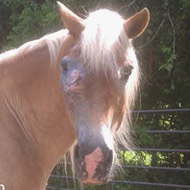
Discovery will help to inform breeding decisions
Scientists at UD Davis School of Veterinary Medicine have identified the genetic risk factor for equine eye cancer.
Squamous cell carcinoma (SCC) is the most common cancer of equine eyes and the second most common cancer in horses.
Writing in the International Journal of Cancer, researchers announced the discovery of a genetic mutation in horses that is thought to impact the ability of DNA-binding protein 2 (DDB2) to repair UV-light damage.
“The mutation is predicted to alter the shape of the protein so it can't recognise UV-damaged DNA,” said equine geneticist Dr Rebecca Bellone. “We believe this is a risk factor because cells can’t repair the damage and accumulate mutations in the DNA that lead to cancer.”
Ocular SCC can cause blindness and even the loss of the eye. In advanced cases, it can spread to the orbit, eat away at the bone - and eventually the brain - leading to loss of life. The results of this study will be able to inform owners in two ways, as research partner Dr Mary Lassaline explains:
“One, it’s important for the individual horse with a known risk and we can be more vigilant about exams as well as protecting their eyes from UV exposure. If detected early, we can remove the tumour and save the eye. Secondly, that knowledge is important for making informed breeding decisions.”
Based on the research, scientists at UC Davis Genetics Laboratory were able to develop a genetic test. The test shows if a horse carries the mutation or has two copies of the risk variant, putting it at high risk of cancer.
It is also hoped the research will have implications for human health, as the gene found to be associated with equine SCC is also linked in humans to a skin cancer known as Xeroderma Pigmentosum group E.
Image (C) UC Davis School of Veterinary Medicine



 The RCVS has announced a new version of its 1CPD mobile app, with enhanced features for veterinary surgeons and veterinary nurses to record their continuing professional development.
The RCVS has announced a new version of its 1CPD mobile app, with enhanced features for veterinary surgeons and veterinary nurses to record their continuing professional development.